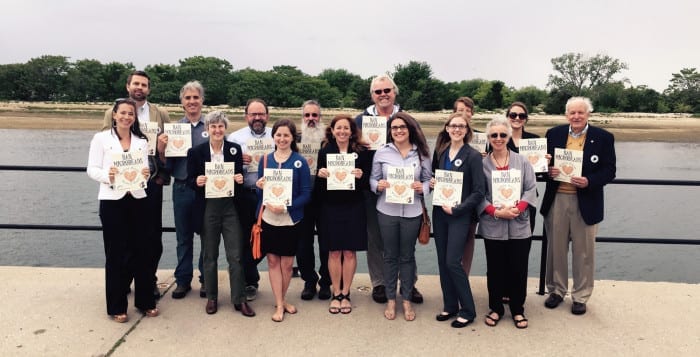When it comes to water pollution, size does not matter.
That’s why a group of environmental advocates gathered along the shoreline of the Long Island Sound in Stony Brook last week to call for state legislation that would ban the tiny but potentially harmful microbeads in personal care products.
The rally was organized to coincide with June 8’s World Oceans Day and zeroed in on the Microbead-Free Waters Act, which would ban personal care products made with the tiny plastic pellets called microbeads, which advocates said are hurting waterways and wildlife because New York’s wastewater treatment plants are not equipped to filter them prior to the water’s release into the environment.
The legislation passed the Assembly in April but has remained idle in the Senate.
The bill is sponsored in the Senate by Republican Environmental Conservation Committee Chair Tom O’Mara (R-Big Flats), with 37 cosponsors — a total that surpasses the 32 votes it needs to pass.
William Cooke, director of government relations for the Citizens Campaign for the Environment, helped orchestrate the rally and called on Sen. John Flanagan (R-East Northport) to use his new role as majority leader to help ensure a microbead ban passes before legislative session ends June 17.
“While microbeads are small, the problem they are creating is very large,” Cooke said. “The solution is unbelievably simple and absolutely free. The answer is to take them out of our products now. This legislation currently has more support than is needed to pass. The only question is will the new Senate Majority Leader John Flanagan allow it to move forward.”
The New York State Attorney General reported that 19 tons of plastic microbeads enter the wastewater stream in New York annually, and the tiny beads are passing through treatment plants on Long Island and throughout the state. Plastic microbeads in state waters accumulate toxins, are consumed by fish, and can work their way up the food chain, putting public health at risk.
“The Microbead-Free Waters Act has a clear pathway to passage. If it’s not brought up for a vote, it’s a clear sign that industry has once again silenced the majority of New York’s state senators,” said Saima Anjam, environmental health director at Environmental Advocates of New York, who was at the rally. “New Yorkers expect more from new leadership. … Senators Flanagan and O’Mara need to allow a simple up or down vote on bills supported by a majority of members.”
Flanagan’s office declined to comment on the matter.
Late last year, Suffolk County committed to studying the health and economic impacts of banning microbeads on the county level to the praise of county Legislator Kara Hahn (D-Setauket), who argued that Suffolk needed to follow the likes of municipalities like Illinois, which was the first state to outright ban the sale of cosmetics containing plastic microbeads.
“On a macro level, there is no doubt that microbeads are finding their way into our nation’s rivers, lakes and oceans,” said Hahn, chairwoman of the Legislature’s Environment, Planning and Agriculture Committee. “What we need to know is to what extent, locally, these additives [impact] our environment and, if corrective action is needed, what ramifications would be expected.”





